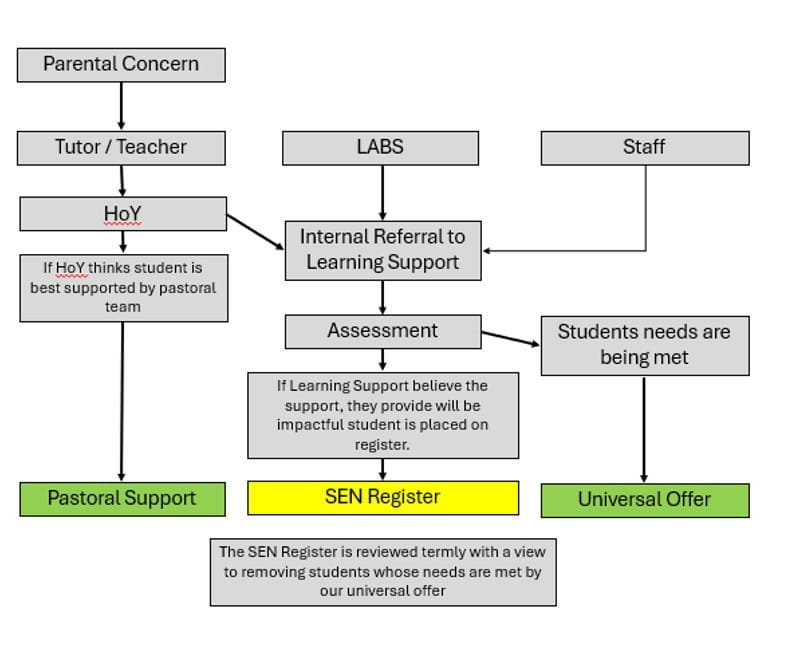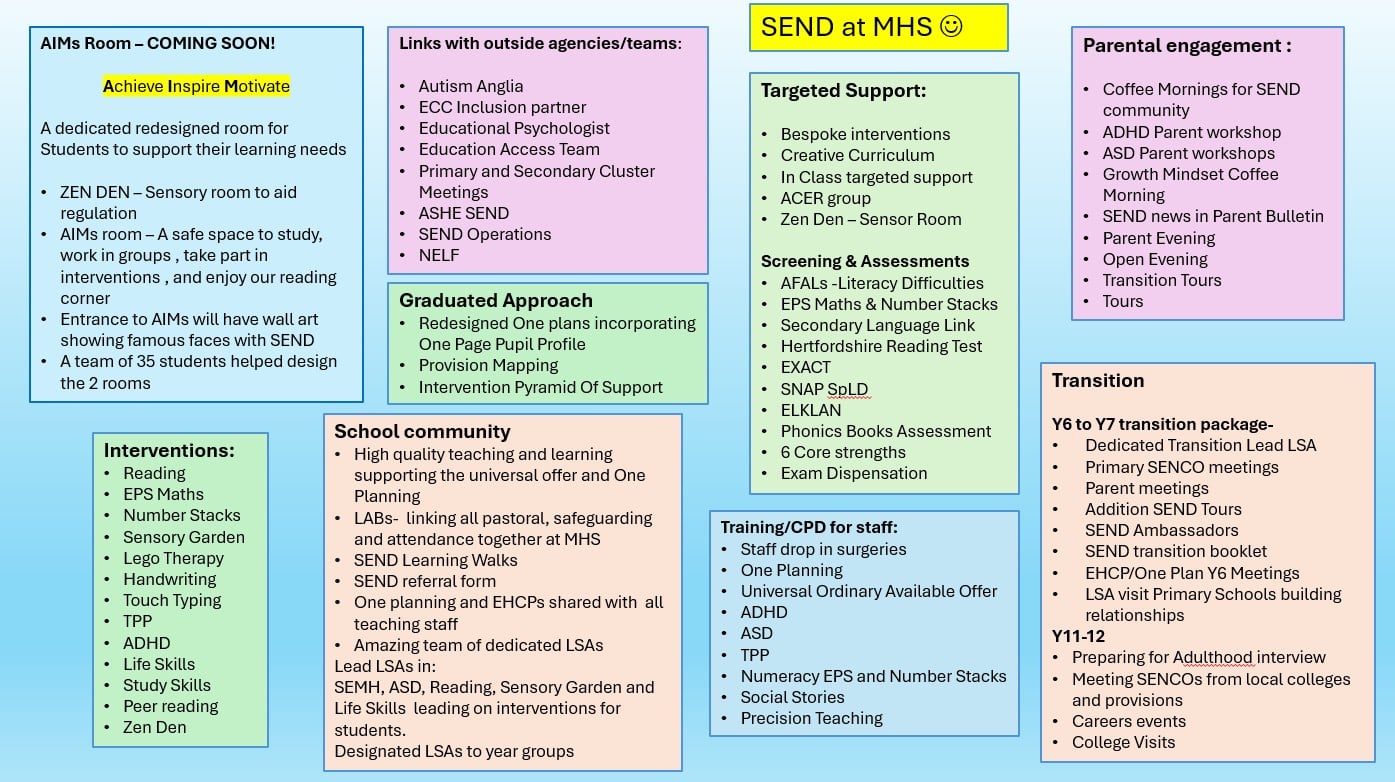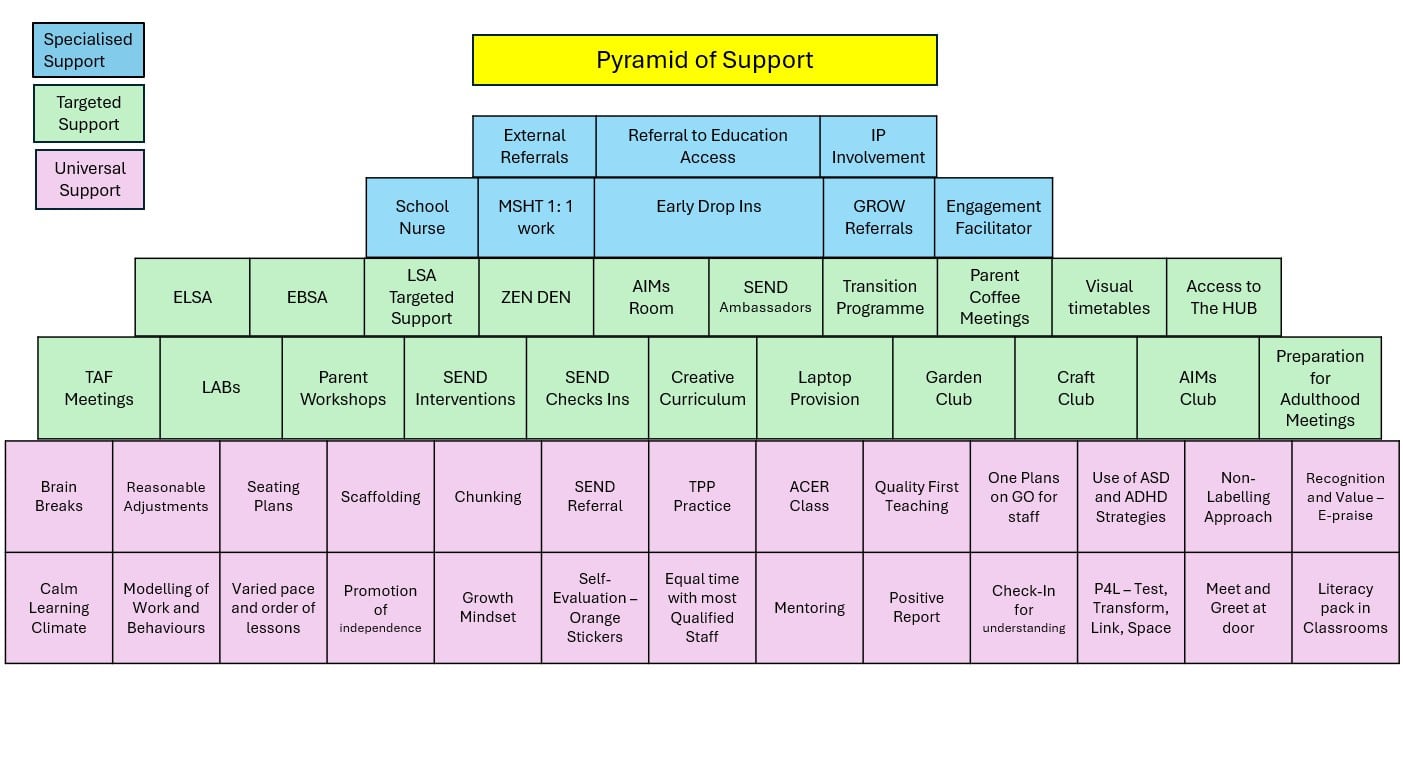SEND
At Manningtree High School we call our SEND Department – Learning Support. The team is led by our SENCo Ms Campbell and Deputy SENCo Ms Spencer and they are supported in their work by our Learning Support Assistants (LSA’s).
Classroom teachers meet the needs of almost all students within the classroom, including students with diagnosis such as ADHD, ASD and Dyslexia. All staff are made aware of student’s needs through our internal information system. Throughout the year a key part of our continuous professional development is focussed on how to meet the needs of students within the classroom. This universal provision is often referred to as ‘Ordinarily Available’.
There are students who require additional or targeted support, because of a special educational need, to progress through the curriculum. Students do not necessarily need a diagnosis to receive this and students with a diagnosis such as ADHD, ASD or Dyslexia do not receive additional support if they do not require it.
When students are receiving targeted support, overseen by the SENCo, they are placed onto our SEN register. Students are added to and removed from the SEN register depending on how appropriate it is for their needs. The SEN Register is managed in line with guidance from the SEND Code of Practice – it is not a guarantee of specific provision.
There are three ways by which we add students to the SEN register. Firstly, if they have an EHCP. Secondly when students arrive from a previous school having been on the SEN register though we assess whether this is appropriate after they have been with us for some time. Thirdly from referrals by staff.

How we support students on the SEN Register
All students on the SEN Register including those with EHCP’s have a One Plan. One Plans include a profile of the student which is shared with staff, and targets which are set and reviewed termly.
Our main curriculum support is the ACER group. This small class of students spend less time studying modern foreign languages in Years 7 & 8 and focus more on reading and writing. As they move into GCSE’s they complete the AQA Step UP qualification. Not all of the students in this class our on the SEN Register.
The AIMS room is open and staffed at break and lunch. This is a room where students can spend their breaks and lunches if they do not feel comfortable on the playground. The room is open to all.
A large number of small group interventions led by our LSA’s happen every day. These include reading, literacy, touch typing, forest school, gardening. They are designed to support students in accessing the curriculum. LSA’s also support students in the classroom and function as case workers for individuals. The Pyramid below outlines much of what support is provided by the Learning Support team.
Access Arrangements for Examinations
When students sit their GCSE’s we are able to put in place a range of access arrangements. These include arrangements such as the use of a laptop, the use of a reading pen and extra time. There are strict rules about what arrangements we can put in place. Most access arrangements are decided upon following screenings.
Screening for Access Arrangements takes place towards the end of Year 9 and onwards. We are not allowed to screen for Access Arrangements before this as it has to be within 26 months of a student’s exams. We are reluctant to put in place arrangements for internal exams in Years 7, 8 and 9 because we do not want to put something in place that might not be allowed following screening. Should you have any concerns please contact our Exams Officer Mr N Rowlands.
Educational Health Care Plans (EHCPs)
If your child’s needs cannot be met with the level of support we typically offer in school, we will collaborate with you to ask the local authority (LA) to assess your child for an EHCP.
EHCP’s are legally binding documents that set out the support that education, health and care providers must provide. Pupils who have an EHCP are entitled to extra-funding from the LA to help them get the specialist support they need.
What to do if you think your child should be on the SEN Register
If you have concerns about how your child is progressing in school you should in the first instance contact their tutor, who might suggest you contact their Head of Year.
If you have concerns about specific subjects you should raise these with the relevant teacher at a Parents Evening. Parents Evenings are only once a year so it might be more appropriate to contact the school via the Main Office in order to speak to the specific teacher.
More information about the Essex County Council SEND ‘Local Offer’ can be located here
Please see the Contact Us page for further school contact information.


The Manningtree High School SENDCo (Special Educational Needs and Disability Coordinator) is Mrs Claudia Campbell, who can be contacted via the school.
More information about the Essex County Council SEND ‘Local Offer’ can be located here
Please see the Contact Us page for further school contact information.



